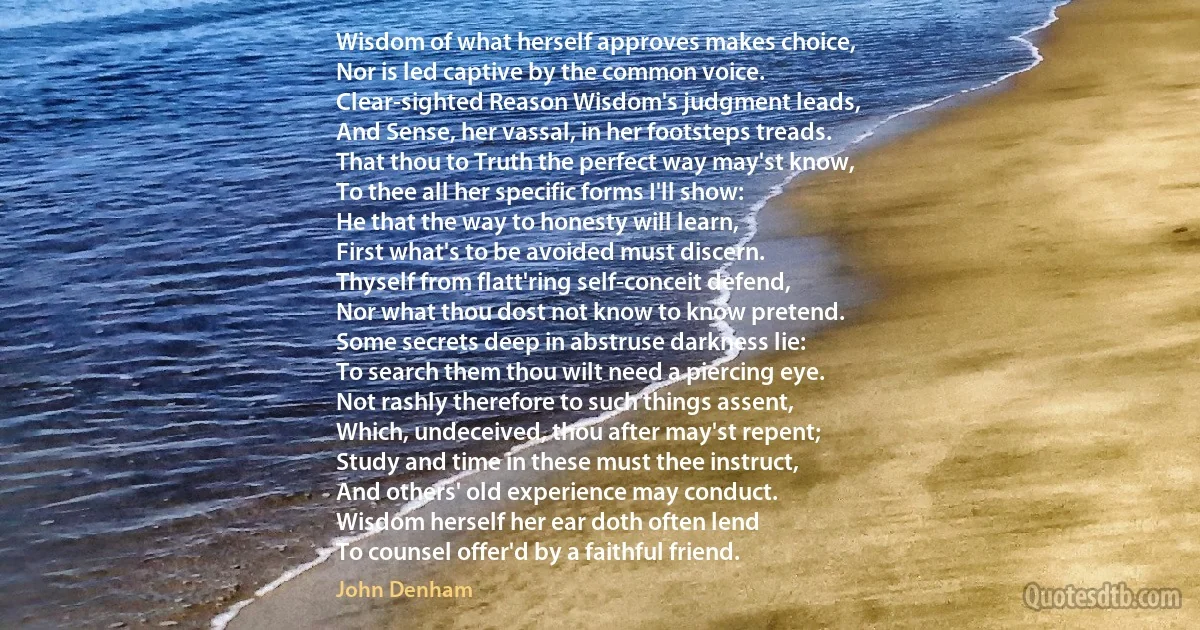
Wisdom of what herself approves makes choice, Nor is led captive by the common voice. Clear-sighted Reason Wisdom's judgment leads, And Sense, her vassal, in her footsteps treads. That thou to Truth the perfect way may'st know, To thee all her specific forms I'll show: He that the way to honesty will learn, First what's to be avoided must discern. Thyself from flatt'ring self-conceit defend, Nor what thou dost not know to know pretend. Some secrets deep in abstruse darkness lie: To search them thou wilt need a piercing eye. Not rashly therefore to such things assent, Which, undeceived, thou after may'st repent; Study and time in these must thee instruct, And others' old experience may conduct. Wisdom herself her ear doth often lend To counsel offer'd by a faithful friend.
John DenhamRelated topics
choice common conduct counsel darkness deep ear experience eye faithful friend honesty judgment led learn lend lie need nor perfect pretend reason search sense show specific study thee thou time truth vassal voice way wisdom others thingsRelated quotes
I, Patrick, a sinner, a most simple countryman, the least of all the faithful and most contemptible to many, had for father the deacon Calpurnius, son of the late Potitus, a priest, of the settlement of Bannavem Taburniae; he had a small villa nearby where I was taken captive. I was at that time about sixteen years of age. I did not, indeed, know the true God; and I was taken into captivity in Ireland with many thousands of people, according to our deserts, for quite drawn away from God, we did not keep his precepts, nor were we obedient to our priests who used to remind us of our salvation. And the Lord brought down on us the fury of his being and scattered us among many nations, even to the ends of the earth, where I, in my smallness, am now to be found among foreigners.

Saint Patrick
Answer me, sycophant, ought you not to have instructed me on one point at least, so essential to be known by a king; namely on the reciprocal duties between the sovereign and his subjects? Ought you not also to have foreseen that I might, at some future period, be compelled to contend with my brothers, sword in hand, for the crown, and for my very existence. Such, as you must well know, has been the fate of the children of almost every king of Hindustan. Did you ever instruct me in the art of war, how to besiege a town, or draw up an army in battle array? Happy for me that I consulted wiser heads than thine on these subjects! Go, withdraw to the village. Henceforth let no person know either who thou art, or what is become of thee.

Aurangzeb
Identical in the physical processes by which he originates-identical in the early stages of his formation-identical in the mode of his nutrition before and after birth, with the animals which lie immediately below him in the scale-Man, if his adult and perfect structure be compared with theirs, exhibits, as might be expected, a marvellous likeness of organization. He resembles them as they resemble one another-he differs from them as they differ from one another.-And, though these differences and resemblances cannot be weighed and measured, their value may be readily estimated; the scale or standard of judgment, touching that value, being afforded and expressed by the system of classification of animals now current among zoologists.

Thomas Henry Huxley
When we approach the study of business cycle with the intention of carrying through an analysis that is truly dynamic and determinate in the above sense, we are naturally led to distinguish between two types of analyses: the micro-dynamic and the macro-dynamic types. The micro-dynamic analysis is an analysis by which we try to explain in some detail the behaviour of a certain section of the huge economic mechanism, taking for granted that certain general parameters are given. Obviously it may well be that we obtain more or less cyclical fluctuations in such sub-systems, even though the general parameters are given. The essence of this type of analysis is to show the details of the evolution of a given specific market, the behaviour of a given type of consumers, and so on.

Ragnar Frisch
I see those pretended politicians who place all their subtlety, and who think they serve their country best, in circumventing those with whom they treat, interpreting the conditions of a treaty in such a manner, that all the advantage results to their own country. Far from blushing at conduct so contrary to equity, to right, and to national honesty, they boast of their dexterity, and pretend that they deserve the name of great negociators. How long shall public men boast of conduct which would disgrace a private individual? ...Shall powerful states abandon openly that which is honest, for that which may appear useful? It often happens for the happiness of the human race, that this pretended utility is fatal to the powers who follow it, and that, even among sovereigns, candour and right are found to be the safest policy.

Henry Temple, 3rd Viscount Palmerston
